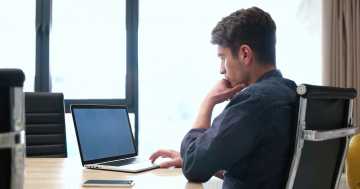Brian de Haaff says many high achievers complain they have to shoulder an unfair burden in their jobs because of the quality of their output — but is this so, or are they really ‘hoarding’ work?
 Were you the kid who loved or hated group assignments in school?
Were you the kid who loved or hated group assignments in school?
If you dreaded working in groups, I think I know why — you were probably the one doing all the work.
While the rest of the kids disappeared to do something more fun, you toiled away with your poster board and glue stick to make the project just right.
Even more frustrating? You are still that same maximum-effort person today — doing all the work while everyone else is playing.
Yes, you might feel like you are the only one putting in any effort.
Before we cue the sad music, let’s take an honest look at your situation.
Could it be that you are the one dragging the project off track?
Maybe this is the result of unclear goals and responsibilities, including your own.
Or could it be that you are taking on loads of work yourself without giving your teammates the chance to step up?
This is a hard one to recognise, but it happens to many high achievers.
Hoarding the work because you know how you want it done hurts you and your team over time.
Part of working with a team is making room for others to contribute, even if you are uncertain of how it will play out.
Instead of stewing in silent frustration, you need to start talking openly with your co-workers about what you see.
You owe it to yourself to resist anger or worse, apathy, and keep pushing forward.
Ideally, this team conversation would address the overall issues in an open way and you can come to an understanding together.
Do not give up if it leads you right back where you started.
Here is how to stay motivated when no one else is.
Acknowledge your part:
You might be hitting your deadline before anyone else, but is your work helping to move the whole team forward?
Or is it simply boosting your own sense of achievement?
Really consider this question.
You might be so busy checking off to-dos that you have failed to prioritise being a better team player.
Ask yourself how others might perceive your working style and what you could do better.
Get others involved:
Are you always the first to volunteer for work?
Maybe you need to take a step back and let someone else raise their hand.
Rather than volunteering for everything, take a more inclusive approach.
Rethink how to structure the next project in a way that does not have you automatically assuming the most responsibility and workload.
In other words, delegate.
Look for helpers:
Surely you are not the only achiever in your organisation.
Look up from that pile of work and seek out other high performers.
Take purposeful steps to support and learn from each other.
For example, you could set up a monthly meeting to discuss ongoing work, talk through challenges you are facing, and swap advice.
Be thankful:
People likely turn to you because you have the talent and gumption to get the job done.
Be grateful that you have the capabilities and opportunities that you do.
Take a moment to appreciate your hard work and the fact that you are able to contribute in a meaningful way.
This is not about pride. It is about giving yourself fuel to keep going.
Keep moving forward:
If you are used to doing all the work yourself, all of the above is going to take some time to get used to, which is normal.
The point is to keep reminding yourself that you cannot reach great accomplishments on your own — you need a team.
So, take incremental steps to involve those around you and move everyone forward in the process.
It is ultimately up to you.
Will you do it all yourself or bring everyone along on the journey towards excellence?
Yes, you might still be feeling like no one cares — but that is not entirely true because you care.
I hope you will choose to keep pushing.
It can be hard and frustrating at times, but the world needs people who care deeply, now more than ever.
*Brian de Haaff is the Chief Executive of cloud-based software company Aha! He can be contacted on Twitter @bdehaaff.
This article first appeared on the Aha! company website.











